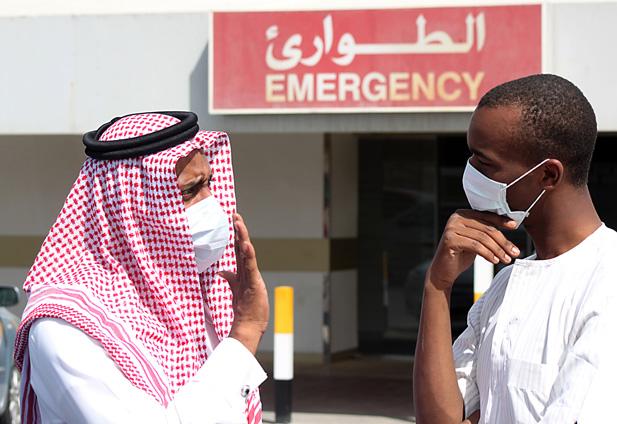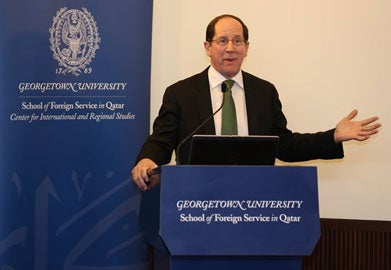A Modern Day Virus Hunter

By Renee Twombly, GUMC Communications
The plotline seems worthy of a blockbuster flick like Outbreak or Contagion. A slowly emerging infection gathers steam in Saudi Arabia, killing 60 percent of those who come in contact with it. Cases start to show up France, Germany, Italy, Tunisia and the United Kingdom. Saudi Arabia remains a hotspot — even as more than a million Muslim pilgrims arrive at the holy sites in Saudi Arabia during Ramadan, which begins around July 9. No one knows whether the infection, which has a long incubation period, will spread when the pilgrims return to their homelands.
Only this isn’t a film script. Saudi Arabia is currently trying to control Middle Eastern Respiratory Syndrome Coronavirus — MERS-CoV, or MERS for short. In June, the World Health Organization (WHO) said MERS has the potential to become a “super-spreader” infection — those affected with pneumonia-like symptoms produce large amounts of the virus in respiratory secretions and pass it to 10 or more other persons. MERS is a cousin of SARS, which spread rapidly to almost 8,000 people in 2003, killing 11 percent of them. As of the beginning of July, MERS is known to have infected at least 72 people, in eight countries, killing 40 of them, according to a July 2 report in the New York Times.
Despite the seemingly low infection rate, in late May, WHO Director-General, Margaret Chan, MD, called MERS “a threat to the entire world.” She told the Associated Press: “Any new disease that is emerging faster than our understanding is never under control. These are alarm bells and we must respond.”

Enter infectious disease and public health physician Daniel Lucey, MD, MPH — a microbial “storm chaser” of sorts. Lucey, an adjunct professor of microbiology and immunology at Georgetown University Medical Center, is one of a dedicated community of self-described germ geeks who have watched this infection since it first reared its tiny viral head over a year ago. His expertise on global viral outbreaks, such as SARS, has led him to travel to five countries — France, Qatar, Jordan, Egypt and the United Arab Emirates — since April to deliver 10 invited lectures and work with hospitals on infection control.
Lucey plans to return to the Middle East to participate with MERS preparedness and response on and off from the beginning of Ramadan until after the Muslim Hajj, the world’s largest annual pilgrimage. It will take place in Saudi Arabia between the dates of October 13-18, and “more than three million Muslims from around the world go to Mecca,” he says.
Lucey has also had discussions in June in the US with such groups as the US Department of Health and Human Service’s Office of Preparedness and Response, the US Food and Drug Administration and the New York City Department of Health and Mental Hygiene. He has been interviewed multiple times by the Al-Jazeera news services (Arabic and English), Qatar Tribune, Emirates 24/7, NPR and other media.
And Lucey has done much of this work, and travel, on his own time and dime. His passion to stop a contagion is his currency.
Richard Calderone, PhD, admires Lucey’s work and dedication. The GUMC department of microbiology and immunology, which Calderone chairs, “has been quite excited about Dr. Lucey’s resolve, accomplishments and enthusiasm to bring back his experiences to all of us.”
Adds Calderone, “Lucey is the modern day equivalent of a microbe hunter.”
“I just can’t watch this on TV…”
Lucey was trained in infectious diseases and public health at Harvard University and its School of Public Health. He worked at the National Institutes of Health in the US Public Health Service as a consultant physician, and began lecturing second-year medical students at GUMC in 2001.
But it was his first job, working as an infectious disease physician in San Francisco in 1982, that set the course of his life’s work. “That was at the beginning, of course, of another novel virus syndrome — AIDS. That was the defining event of my infectious disease career,” Lucey says. “I always try to stay ahead and learn as quickly as possible about emerging infectious diseases, especially if they are contagious and especially if they appear to be highly lethal. So AIDS is the paradigm.”
In 2001, he gained additional experience managing a potentially immediate medical crisis when, as Chief of Infectious Disease services at MedStar’s Washington Hospital Center, he was responsible for developing plans to respond to what was believed to be an imminent anthrax attack.
But it was in 2003 that Lucey saw SARS as “infectious disease history happening right in front of my eyes. SARS was a novel acute contagious respiratory infectious disease, as opposed to a chronic non-respiratory disease like AIDS or hepatitis C.”
When he saw people wearing masks in Hong Kong, where schools were closing and social life stopped, “I thought ‘I have to go see this in person. I just can’t watch it on TV.’”
The outbreak of SARS riveted him because it was novel and spread so rapidly; it could not have been predicted or easily halted. In China, SARS spread from bats to the civet cat (a culinary delicacy) to humans. It appeared in 2002 in China, but by early 2003 had spread to 29 nations on five continents.
He went from Guangzhou China, where it started, to hospitals in Hong Kong, where it became evident, to Toronto, where it hit the hospitals so hard they became “SARS hospitals.” He worked with physicians who were on the forefront of the outbreak, and he then spent much of the next decade learning what worked best.
He amassed the fine details of optimal hospital preparedness in response to an infectious disease outbreak — a plan he has been sharing with his colleagues in many nations. After all his work, Lucey became part of what he describes as “an incredible bond of professional colleagues and infectious disease doctors. We are challenged to do more than we have ever done before and more than we think we can do because of the life-and-death nature of these viral outbreaks.”
Lucey worries that “MERS is SARS until proven otherwise — and it is much more lethal.”
He spreads the message that there are two lessons to be learned from SARS. One is that hospital outbreaks are early warnings of the rise of a worrisome contagious virus, and that such a virus can easily spread through air travel. He tells physicians that the virus can be halted by strictly observing infection-control precautions within hospitals, which is how SARS was stopped. He also says physicians treating MERS patients should, as much as possible, offer their patients the latest antiviral combination therapies, and record through clinical trials how those patients respond.
Lucey stressed that he is just one of many infectious disease experts who are on the ground, helping those who may soon be medical warriors at the contagion frontline. “I am driven by my searing memory of SARS to share what I know,” he says. “I don’t want MERS to turn into the subject of a blockbuster.”
By Renee Twombly, GUMC Communications
